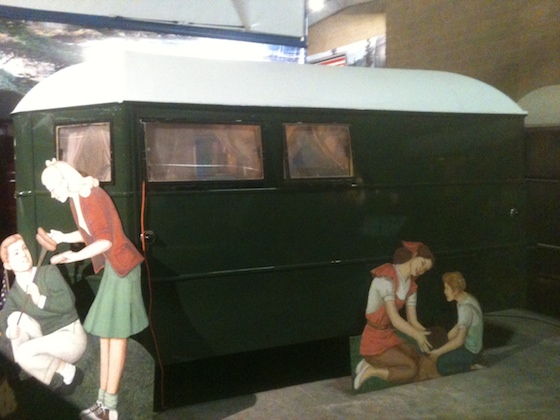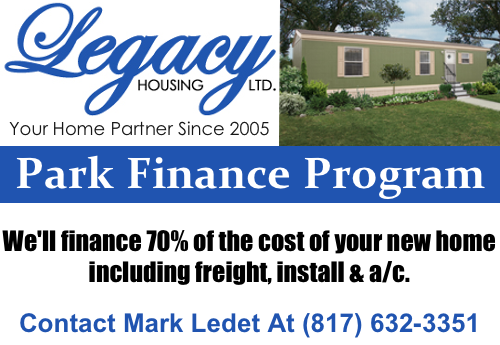Virtually every industry has a museum of some type – so why not mobile homes? Still, the scale of the MH/RV Museum and Hall of Fame in Elkhart, Indiana was much more impressive than I expected. You might expect a mobile home museum to be in an abandoned Sears store in a blighted neighborhood, but this is a multi-million structure right next to a highway. The museum is set up in three exhibit areas. One is strictly for new RVs (probably to try and interest you enough to buy one). Another section offers exhibits of mobile home and RV products (probably the sponsors of the museum for that year). But the main attraction is the giant gallery of RVs from their earliest invention to the birth of the mobile home. It’s in the form of a rambling path with backgrounds and decorations of each period.
The first production travel trailer in the United States was the “Covered Wagon”, introduced in 1929. The company went public in 1937 on the NYSE, but was out of business by 1941. Did World War II end it, or did people get tired of explaining what the heck it was? Regardless, this is the Grandfather of all mobile homes.
By 1935, the designs had improved significantly. The “Bowlus Road Chief” is one of the most interesting RVs in the museum, showing some extremely advanced design elements, such as the aluminum exterior. This design, by Hawley Bowlus, is credited as the origin of the Airstream trailer that is still manufactured today.
The 1937 “Hunt Housecar” was another advance, as it is no longer a trailer but an actual motorhome. It was designed and built by Hollywood producer Roy Hunt. It’s stylish design uses Bowlus’ aluminum exterior, and includes an interior that looks like something from a comic book. This is where the MH and RV , in my opinion, begin to go down different paths.
By comparison, here’s the 1936 Roadhome Coach. Built in Los Angeles, with Masonite exterior, this is obviously much more spartan than the Housecar, and was intended for actual living. I have been in many older mobile homes that greatly resemble this interior.
The 1937 Hayes Motor Home also resembles the mobile homes of the 1950’s. Note the expensive carpentry and quality woods in the interior. This was designed for the option of permanent living, and I’m sure that many a family in the depression lived for years in it.
By 1939, the DNA of mobile homes was written all over this unit, the Schult 8’ x 20’ House Trailer. Note that Schult is still a manufacturer of mobile homes – that’s an unbelievably long run for a mobile home manufacturer (I think the longest in the museum). Schult builds good quality homes today, and this one, although bare-bones, looks very solid.
This 1950 Fleetwood was the first model that Fleetwood ever built. Of course, Fleetwood, now a part of CAVCO, is one of the largest mobile home manufacturers in the U.S. But back in 1950, the plan was to build simple, small travel trailers.

And that brings us up to the most modern mobile home in the MH Museum. And that’s the remarkable 1954 Spartan Imperial Mansion, an 8’ x 42’ mobile home, and, in my opinion, the forefather of the modern mobile home industry. These mobile homes were built by the Spartan Aircraft Company in Tulsa after World War II, using the aluminum stock left from warplanes. They were the finest mobile homes in existence in the 1950’s, and were built as permanent residences. For those who have read J. Paul Getty’s biography, these mobile homes were Getty’s brainstorm to keep the aircraft factory alive after the end of World War II. He made an outstanding design, and the production quality was unequalled – the exteriors were sealed just like the planes, so they were completely water tight.



The museum also offers various exhibition cases of model mobile homes and RVs, an exhibit on historical mobile home photos, and a gift shop. I noticed on the sponsorship plaque that three individuals had donated over $1 million to build the museum – with one person giving over $2 million. I had no idea that a mobile home and RV museum would garner that much support. If you are ever in Indiana, you should drop by and take a look.















